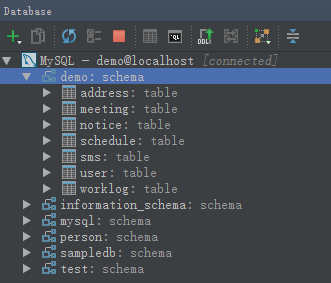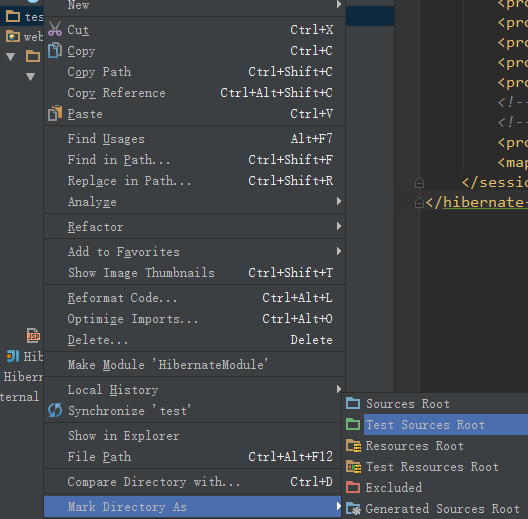【转载】Intellij IDEA的Hibernate简单应用











package com.yyq.dao;
import javax.persistence.*;
@Entity
@Table(name = "user", schema = "", catalog = "demo")
public class UserEntity {
private int id;
private String username;
private String password;
private String email;
@Id
@Column(name = "id", nullable = false, insertable = true, updatable = true, length = 10, precision = 0)
public int getId() {
return id;
}
public void setId(int id) {
this.id = id;
}
@Basic
@Column(name = "username", nullable = true, insertable = true, updatable = true, length = 50, precision = 0)
public String getUsername() {
return username;
}
public void setUsername(String username) {
this.username = username;
}
@Basic
@Column(name = "password", nullable = true, insertable = true, updatable = true, length = 50, precision = 0)
public String getPassword() {
return password;
}
public void setPassword(String password) {
this.password = password;
}
@Basic
@Column(name = "email", nullable = true, insertable = true, updatable = true, length = 50, precision = 0)
public String getEmail() {
return email;
}
public void setEmail(String email) {
this.email = email;
}
@Override
public boolean equals(Object o) {
if (this == o) return true;
if (o == null || getClass() != o.getClass()) return false;
UserEntity that = (UserEntity) o;
if (id != that.id) return false;
if (email != null ? !email.equals(that.email) : that.email != null) return false;
if (password != null ? !password.equals(that.password) : that.password != null) return false;
if (username != null ? !username.equals(that.username) : that.username != null) return false;
return true;
}
@Override
public int hashCode() {
int result = id;
result = 31 * result + (username != null ? username.hashCode() : 0);
result = 31 * result + (password != null ? password.hashCode() : 0);
result = 31 * result + (email != null ? email.hashCode() : 0);
return result;
}
}

7)配置hibernate.cfg.xml 如下。

<?xml version='1.0' encoding='utf-8'?>
<!DOCTYPE hibernate-configuration PUBLIC
"-//Hibernate/Hibernate Configuration DTD//EN"
"http://www.hibernate.org/dtd/hibernate-configuration-3.0.dtd">
<hibernate-configuration>
<session-factory>
<property name="connection.url">jdbc:mysql://localhost:3306/demo</property>
<property name="connection.driver_class">com.mysql.jdbc.Driver</property>
<property name="connection.username">root</property>
<property name="connection.password">123456</property>
<property name="current_session_context_class">thread</property>
<property name="show_sql">true</property>
<property name="hbm2ddl.auto">update</property>
<!-- DB schema will be updated if needed -->
<!-- <property name="hbm2ddl.auto">update</property> -->
<property name="dialect">org.hibernate.dialect.MySQLDialect</property>
<mapping class="com.yyq.dao.UserEntity"/>
</session-factory>
</hibernate-configuration>

8)生成测试路径。在Module路径下生成一个文件夹,与src同级,名为test,点击文件夹test,右键,选择Mark Directory As - > Test Sources Root。


package com.yyq;
import com.yyq.dao.UserEntity;
import org.hibernate.Session;
import org.hibernate.SessionFactory;
import org.hibernate.Transaction;
import org.hibernate.cfg.Configuration;
import org.junit.Before;
import org.junit.Test; public class DAOTest {
Configuration config = null;
SessionFactory sessionFactory = null;
Session session = null;
Transaction tx = null;
@Before
public void init() {
config = new Configuration().configure("/hibernate.cfg.xml");
sessionFactory = config.buildSessionFactory();
session = sessionFactory.openSession();
tx = session.beginTransaction();
}
//增加
@Test
public void insert() {
UserEntity ue = new UserEntity();
ue.setUsername("Anny");
ue.setPassword("123");
ue.setEmail("Anny@163.com");
session.save(ue);
tx.commit();
}
//修改
@Test
public void update() {
UserEntity user = (UserEntity) session.get(UserEntity.class, new Integer(2));
user.setUsername("Penny");
session.update(user);
tx.commit();
session.close();
}
//查找
@Test
public void getById() {
UserEntity user = (UserEntity) session.get(UserEntity.class, new Integer(8));
tx.commit();
session.close();
System.out.println("ID号:" + user.getId() + ";用户名:" + user.getUsername() +
";密码:" + user.getPassword() + ";邮件:" + user.getEmail());
}
//删除
@Test
public void delete() {
UserEntity user = (UserEntity) session.get(UserEntity.class, new Integer(6));
session.delete(user);
tx.commit();
session.close();
}
}

10)运行测试类,可以一个一个方法的进行运行,也可以在类名处将所有的测试方法都一起运行。全部运行成功!



<?xml version="1.0" encoding="UTF-8"?>
<web-app xmlns="http://java.sun.com/xml/ns/javaee"
xmlns:xsi="http://www.w3.org/2001/XMLSchema-instance"
xsi:schemaLocation="http://java.sun.com/xml/ns/javaee
http://java.sun.com/xml/ns/javaee/web-app_3_0.xsd"
version="3.0">
<display-name>Struts2AndHibernate</display-name>
<filter>
<filter-name>struts2</filter-name>
<filter-class>org.apache.struts2.dispatcher.ng.filter.StrutsPrepareAndExecuteFilter</filter-class>
</filter>
<filter-mapping>
<filter-name>struts2</filter-name>
<url-pattern>/*</url-pattern>
</filter-mapping>
<welcome-file-list>
<welcome-file>index.jsp</welcome-file>
</welcome-file-list>
</web-app>

2)将相关的Jar包复制到lib文件夹下。

3)创建一个名为ListAllAction.java文件。

package com.yyq.action;
import com.googlecode.s2hibernate.struts2.plugin.annotations.SessionTarget;
import com.googlecode.s2hibernate.struts2.plugin.annotations.TransactionTarget;
import com.opensymphony.xwork2.ActionSupport;
import com.yyq.dao.UserEntity;
import org.hibernate.Session;
import org.hibernate.Transaction;
import java.util.List;
public class ListAllAction extends ActionSupport {
//使用@SessionTarget标注得到Hibernate Session
@SessionTarget
private Session session = null;
//使用@TransactionTarget标注得到Hibernate Transaction
@TransactionTarget
private Transaction transaction = null;
private List<UserEntity> users;
public String list(){
try{
//得到user表中的所有记录
users = session.createCriteria(UserEntity.class).list();
transaction.commit();
session.close();
return SUCCESS;
}catch (Exception e){
e.printStackTrace();
return ERROR;
}
}
public List<UserEntity> getUsers(){
return users;
}
public void setUsers(List<UserEntity> users){
this.users = users;
}
}

4)修改index.jsp文件以显示后台数据库的数据获取情况。

<%@ taglib prefix="s" uri="/struts-tags" %>
<%@ page contentType="text/html;charset=UTF-8" language="java" %>
<html>
<head>
<title>显示数据</title>
</head>
<body>
<table>
<tr>
<th>ID</th>
<th>用户名</th>
<th>密码</th>
<th>邮箱</th>
</tr>
<s:iterator value="users" var="obj">
<tr>
<td><s:property value="id"/></td>
<td><s:property value="username"/></td>
<td><s:property value="password"/></td>
<td><s:property value="email"/></td>
</tr>
</s:iterator>
</table>
</body>
</html>

5)配置struts.xml文件。

<?xml version="1.0" encoding="UTF-8"?>
<!DOCTYPE struts PUBLIC
"-//Apache Software Foundation//DTD Struts Configuration 2.1.7//EN"
"http://struts.apache.org/dtds/struts-2.1.7.dtd">
<struts>
<!--s2hibernate插件里面有一个叫hibernate-default的package,
它里面的拦截器用于实现struts2+hibernate整合-->
<package name="default" extends="hibernate-default">
<!--defaultStackHibernate里面的拦截器会识别出@SessionTarget,@TransactionTarget等标注,
然后将hibernate注入进去-->
<default-interceptor-ref name="defaultStackHibernate"/>
<default-class-ref class="com.yyq.action.ListAllAction"/>
<action name="listAll" method="list">
<result>index.jsp</result>
</action>
</package>
</struts>

6)启动Tomcat,输入:http://localhost:8080/listAll.action

7)项目结构图。

【转载】Intellij IDEA的Hibernate简单应用的更多相关文章
- Intellij IDEA的Hibernate简单应用
1.创建数据库及其表 create database demo; use demo; CREATE TABLE `user` ( `id` int(10) unsigned NOT NULL ...
- 新秀学习Hibernate——简单的增加、删、更改、检查操作
部分博客使用Hibernate单的样例,把数据库的映射显示了出来在上一篇的博客基础上这篇博客讲述怎样利用Hinbernate框架实现简单的数据库操作. 1.增加junit.jar 2.新建一个工具类H ...
- 菜鸟学习Hibernate——简单的增、删、改、查操作
上篇博客利用Hibernate搭建起一个简单的例子,把数据库的映射显示了出来在上一篇的博客基础上这篇博客讲述如何利用Hinbernate框架实现简单的数据库操作. 1.加入junit.jar 2.新建 ...
- *IntelliJ IDEA配置Hibernate
为IntelliJ IDEA安装Hibernate插件
- 【笔记】IntelliJ IDEA配置Hibernate
参考:imooc:http://www.imooc.com/video/7706 1.创建Hibernate的配置文件. 将依赖包导入项目.http://blog.csdn.net/a15337525 ...
- Hibernate二次学习一----------Hibernate简单搭建
因为博客园自带的markdown不太好用,因此所有markdown笔记都使用cmd_markdown发布 Hibernate二次学习一----------Hibernate简单搭建: https:// ...
- 转载 intellij IDEA 使用体验 (本人感觉它的使用是一种趋势)
从去年开始转java以来,一直在寻找一款趁手的兵器,eclipse虽然是很多java程序员的首选,但是我发现一旦安装了一些插件,workspace中的项目达到数10个以后,经常崩溃,实在影响编程的心情 ...
- Spring+SpringMVC+Hibernate简单整合(转)
SpringMVC又一个漂亮的web框架,他与Struts2并驾齐驱,Struts出世早而占据了一定优势,下面同样做一个简单的应用实例,介绍SpringMVC的基本用法,接下来的博客也将梳理一下Str ...
- Intellij IDEA 配置最简单的maven-struts2环境的web项目
在idea里搭建maven项目 看着网上大神发的各种博客,然后自己搭建出来一个最简单的maven-strtus2项目,供初学者学习 新建project
随机推荐
- Linux下diff与patch命令的配合使用
在Linux下,diff与patch命令配合使用可以进行简单的代码维护工作. [A] diff diff命令用于比较文件的差异,可以用于制作patch文件.但此命令参数众多.格式多样,所以在此仅介绍较 ...
- GROOVY简单语法实习
慢慢的看<GROOVY IN ACTION>的一个中文节译本,根据上面的东东慢慢练习. 中文看起来确实比英文快好多...:) Book gina = new Book('Groovy in ...
- http-runtime属性
配置httpRuntime也可以让FileUpload上传更大的文件,不过设置太大了会因用户将大量文件传递到该服务器而导致的拒绝服务攻击(属性有说明) 属性 属性 选项 说明 appRequestQu ...
- [bzoj3339]Rmq Problem||[bzoj3585]mex_线段树
Rmq Problem bzoj-3339||mex bzoj-3585 题目大意:给定一个长度为n的数列a,多次讯问区间l,r中最小的不属于集合{$A_l,A_{l+1}...A_r$}的非负整数. ...
- 洛谷——P1031 均分纸牌
https://www.luogu.org/problem/show?pid=1031#sub 题目描述 有 N 堆纸牌,编号分别为 1,2,…, N.每堆上有若干张,但纸牌总数必为 N 的倍数.可以 ...
- [转]十五天精通WCF——第八天 对“绑定”的最后一点理解
转眼已经中断10几天没有写博客了,也不是工作太忙,正好碰到了端午节,然后最近看天津台的爱情保卫战入迷了...太好看了,一直都是回味无穷...而且 涂磊老师话说的真是tmd的经典,然后就这样耽搁了,好了 ...
- LA 3695 部分枚举
运用部分枚举的思想,很明显完全枚举点的思想是不可能的.改为枚举上下边界,当确定右边界j后,对左边界i,可以有点数为on[j]+on[i]+(leftu[j]-leftu[i])+leftd[j]-le ...
- H3C交换机经常使用命令汇总
H3C交换机经常使用命令 1.查看Linux下查看port状态 root@root:~# netstat -an|grep -E "6002|6003" 2.H3C交换机显示当前配 ...
- hdu5119 Happy Matt Friends(dp)
题目链接:点击打开链接 题目描写叙述:给出n个数.求从这n个数中随意取出一些数(至少取一个)相互异或之后大于m的方案数? 解题思路:分析因为n<=40&&m<=10^6,因 ...
- Apache + Tomcat + JK 集群
原文请见http://www.cnblogs.com/dennisit/p/3370220.html 本文介绍了集群和负载均衡的基本开源实现,实现了用Apache分发请求到多个Tomcat里面相应的应 ...
